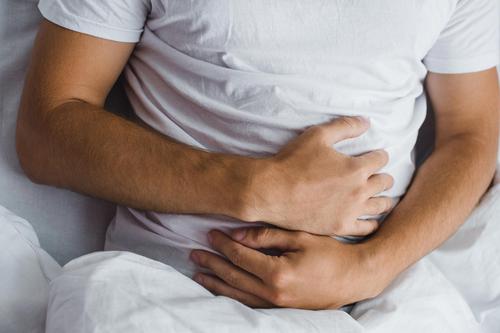Lower Abdominal Pain: Causes and Remedies
Pain in the lower abdomen area, or more commonly known as the belly and pelvis, can be caused by various conditions. The pain can be dull, sharp, intermittent, constant or crampy. Usually, this discomfort occurs due to problems in the digestive tract, bladder or reproductive organs.
Read on to find out possible reasons why you're having a stomachache and what you can do about it.

Possible Causes and Remedies
Here are some common causes of abdominal pain and how you can treat them. Note that this list should only be used as a general guide and not as professional medical advice. Don't hesitate to consult a doctor, especially if your pain is severe.
1. Indigestion
Indigestion can result in pain in the lower abdomen and can be accompanied by other symptoms, such as heartburn and flatulence. It usually appears soon after eating or drinking. This condition is usually not a cause of concern.
This condition can be easily managed with over-the-counter medication, such as antacids and aspirin, as well as heating pads. Try not to eat and drink too quickly to prevent this from reoccurring. If the symptoms persist for more than two weeks, consult a doctor to see if there are any underlying issues.
2. Gas
Sometimes, food isn't digested properly in your stomach, causing excess gas to build up. This usually results in discomfort, bloating, and excessive flatulence.
This condition will usually pass on its own in a matter of hours. You can get over-the-counter medication to help alleviate the pain as well. To prevent this from happening in the future, try to avoid these foods and drinks:
- Soft drinks
- Alcohol
- Hard candy
- Chewing gum
- Lentils
- Beans
- Cabbage
- Fatty foods
3. Constipation
Constipation is a common cause of lower abdominal pain. If you notice that you haven't been passing stool for a couple of days, this may be why you're experiencing discomfort.
Take a mild stool softener or laxative to help kickstart your bowel movement. To reduce your chance of experiencing constipation in the future, make sure to consume enough fiber, drink enough water, and exercise regularly.
4. Lactose Intolerance
Some people don't produce enough lactase, the enzyme needed to digest lactose. As a result, they can't digest dairy products properly. Lactose intolerance can cause various symptoms such as abdominal pain, nausea, bloating, and diarrhea.
There isn't a cure for lactose intolerance but you can alleviate the pain by taking over-the-counter medications to stop symptoms such as nausea and diarrhea. You should also avoid dairy products such as milk and cheese in the future. Please consult your doctor to learn more about this condition.
5. Irritable Bowel Syndrome
Irritable bowel syndrome or IBS is a long-term gastrointestinal problem that can cause persistent abdominal pain. Other symptoms of this condition include stomach cramps, gas, bloating, fatigue, and headaches.
There's currently no cure for IBS but you can alleviate the pain by taking over-the-counter medications. You should also consider limiting your consumptions of these foods:
- Chocolate
- Dairy products
- Alcohol
- Coffee
- Beans
- Banana
- Carrot
- Cabbage
- Fried foods
- Fatty foods
6. Appendicitis
If you feel a persistent dull pain in the lower right abdomen along with debilitating nausea and abdominal swelling, you might have appendicitis. This condition refers to the inflammation or infection of your appendix. An inflamed appendix can rupture if not taken care of immediately, putting you in grave danger.
There are no home remedies for this condition. You must seek medical help immediately. You may even require immediate surgery. In this situation, stay calm and go to the hospital immediately. Don't eat, drink, or use any pain remedies and heating pads as they may cause the appendix to rupture.
7. Kidney Infection
If you feel a terrible abdominal pain accompanied by nausea, fever, diarrhea, and blood in the urine, you may have a kidney infection. Pain on the right side of the abdomen might indicate that your right kidney is infected and vice versa.
No home remedies can help this issue. Contact your doctor immediately if you believe that you may be suffering from this condition. Immediate medical attention is needed to avoid permanent damage to your kidneys.
8. Urinary Tract Infection
As mentioned earlier, problems with your bladder can also cause lower abdominal pain. UTI is a very common problem, especially among women. It occurs when harmful bacteria get inside the urinary system. You might experience some burning sensations and frequent urination.
The best way to cure a UTI is to consult your doctor and take antibiotics. However, there are also some home remedies you can try to alleviate the discomfort, such as drinking cranberry juice, taking vitamin C supplements, and drinking a lot of water. You can also increase your probiotic intake by consuming:
- Yogurt
- Kimchi
- Kombucha
- Tempeh
- Pickles
- Miso
- Kefir
Takeaway Message
Pain in the lower abdomen can be caused by many conditions. While some aren't a cause of concern, others can be very dangerous if left untreated. You can try some home remedies if the pain isn't too severe, but if the pain is very severe or persists for a long period of time, contact your doctor immediately or pay a visit to the emergency room.
